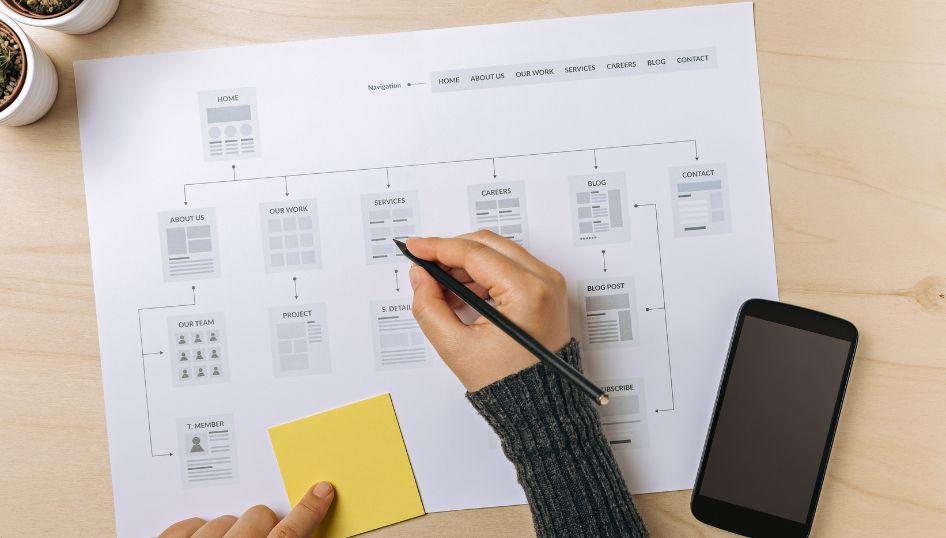Key Steps in the Web Design Consultation Process
A productive web design consultation session sets the foundation for a triumphant web undertaking. In this article, we’ll delve into the crucial stages of the consultation process, from comprehending your specific needs to successfully launching your website.

Importance of a web design consultation
Having a web design consultation is really important when you’re choosing a company for your web project. This meeting is a big deal because it helps you figure out what you’ll get from the agency, how they work, if their prices and availability are right for you and if they are generally a good fit for your business. It also gives you a good sense of the company’s attitude and culture, which matters a lot, especially if you want to work with them for a long time.
We believe that the best way to have a successful consultation is to come prepared. Do some research, know what you want, and ask the web designers some awesome questions too.
Overview of the web design process
When it comes to the design process, there are several important steps to follow. First, you need to identify your goal for the website. What do you want to achieve with it? Next, determine the scope of your project by understanding your client requirements and preferences. This will help you define the overall objectives and goals you want to accomplish.
The next steps involve the actual design and creation of your website. You’ll need to gather resources such as quality images, logos, and style guides. It’s also important to consider the personnel involved, such as writers for website content creation and staff for website maintenance.
During the discovery phase, you’ll conduct user research and evaluate your website if you have one. This will help you understand what works and what needs improvement. From there, you can move on to planning, designing, developing, and testing your website. Finally, when everything is ready, it’s time to launch your website and make it available to your target audience.

What is a website design consultation
A web design consultation is an essential step in the process of creating or redesigning a website. It involves discussions between a company seeking a website or a revamp of their current website and a professional design company. This consultation can serve various purposes, from seeking industry advice to improve planning and design, to exploring potential website design teams for taking over the entire project. Regardless of the specific goal, the focus is always on getting the best possible outcome for the new website.
During a consultation, key areas are addressed and prioritized to ensure a successful web project. These areas may include client requirements, goals and objectives, user research, Job remit, collaboration, timeline, budget, and more. By addressing these aspects in the consultation, the company and website design team can align their visions and set the stage for an effective and efficient website development process.

Importance of the initial consultation
The initial meeting with an digital agency, called the initial web design consultation, is super important for your project. To start, you need to create a website brief. This document helps you explain what you want and gives the agency info about your business. You should mention why you’re doing the project—like getting more customers or making your company look better.
You can also think about other services you might need, such as marketing or website maintenance. Remember, the website brief isn’t a set of instructions for the designers, but more like a plan to help them understand what you want. It’s like telling a chef what ingredients you have, and they decide how to make something great for you! Before you meet with web developers, make sure to send them your website brief. This way, they can study it, understand your needs, and prepare their own questions to ask you.
Role of web designers in gathering client requirements
The role of a website designer in gathering client requirements during the initial consultation stage is to understand the client’s needs and goals for their website. This includes understanding the client’s target market, the purpose of the website, and the desired functionality.
To extract information out of clients to get clarity on what the client wants, most web designers typically ask a series of questions. These questions may cover the following topics:
- The client’s business: What does the business do? Who are their customers? What are their goals for their website?
- The client’s target audience: Who is the website for? What are their needs and wants?
- The purpose of the website: What will the website be used for? Will it be used for marketing, sales, customer support, or something else?
- The desired functionality: What features does the client want on their website? Do they want a blog, a contact form, an online store, or something else?
- The client’s budget: How much money is the client willing to spend on their website?
A Web agency also use a variety of other tools to gather client requirements, such as:
- Site visits: If possible, web designers will visit the client to get a better understanding of their needs.
- Competitive analysis: Web designers will look at the websites of the client’s competitors to see what features they offer and how they are designed.
- Mood boards: A Web agency will create mood boards to help the client visualize the look and feel of their website.
Once the website designer has gathered enough information, they will create a requirements document. This document will summarize the client’s needs and goals, and it will serve as a blueprint for the website design process.

Identifying red flags during the consultation
When you’re creating a website for your business, it’s crucial to have the right people for the job. But finding the right website design and development team can be challenging. You need to be aware of potential scams and frauds. Let’s explore some red flags to watch out for during the consultation process.
Warning signs
Your business website represents your brand, products, and goals. Partnering with a web design agency that jeopardizes your website can harm your entire business. In today’s digital age, businesses with a strong online presence have an advantage. So, it’s important to be cautious during the hiring process and watch out for the following red flags in web development agencies.
Unresponsiveness/Lack of Communication
If an agency is unresponsive or doesn’t communicate well, it’s a major red flag. Lack of contact shows disrespect and unprofessionalism. It may indicate that they don’t take your project seriously. While technical difficulties can happen, a prolonged absence of response suggests poor organization on their part. A professional agency values communication and keeps you informed throughout the website creation process.
Promise of Low Fees and Fast Results
Beware of agencies that promise low fees and quick results. These claims often lead to unsatisfactory outcomes or even scams. Quality design and development services usually range from £700 to £10,000. Any offer significantly lower than that should raise concerns. Custom web design takes time, and companies advertising unrealistically short timeframes may not deliver satisfactory results.
Fewer Questions (More Problems)
A custom website requires understanding your business and its goals. If a company doesn’t ask many questions and claims to handle everything for you, it’s a red flag. They should be curious about your business, strategies, and requirements. Their lack of interest may lead to mediocre results due to assumptions and a lack of research.
No Detailed Strategy for Web and Data Security
Web development agencies should have clear web security protocols and data protection measures in place. If an agency avoids discussing these or charges extra for security, it’s a red flag. Your website’s security is crucial, and a lack of proper measures can leave your data vulnerable to cyber threats. Transparency in web and data security is essential for a reliable agency.
Absence of Portfolios and Reviews
A reputable agency should have a portfolio showcasing their previous work and positive reviews from clients. If an agency lacks samples or reviews, it could mean they have limited experience or a poor reputation. While new companies may not have a complete portfolio, partnering with them carries some risk. Conduct research and consider the opinions of others before making a decision.
Without the SEO Expertise and Lead Generation
If you’re looking for a web development agency that offers SEO services, be cautious. Some agencies may not include SEO in their services, or they may claim to use a one-size-fits-all approach, which is not effective. Search engine optimisation requires expertise and customization according to your target market and the amount of website traffic you would like to attract . Hiring a separate SEO agency can result in additional expenses.
Their Own Site Needs Repair
When a web development agency’s own website is ineffective or unprofessional-looking, it’s a red flag. Their website should reflect their experience and quality of work. A consistent and polished website demonstrates their capabilities and attention to detail.
In conclusion, being aware of alarm bells during the consultation process is crucial for selecting the right agency. Pay attention to communication, promises, security, portfolios, and their own website. By doing so, you can avoid potential scams, ensure quality work, and achieve success with your website project.

What to Expect During a Discovery Phase
During discovery stage, there are several key steps that you can expect. Let’s take a closer look at each of these steps:
Definition and purpose of the discovery phase: The discovery phase is a crucial part of any website project. It involves initial discussions and outlining the project’s requirements and goals. The purpose is to ensure everyone involved, including the client and the web designer, has a shared understanding of the objectives and what success looks like.
Gathering client preferences and goals: In this step, the web consultant collects the client’s preferences and goals for the website. This includes understanding the desired outcomes, whether it’s increased lead generation, improved online visibility, or specific marketing objectives. By gathering this information, they can align their efforts with the client’s expectations.
Assessing the current website or design elements: If there is an existing website, it is essential to assess its strengths and weaknesses. This evaluation helps identify what elements can be improved or redesigned to meet the client’s goals effectively. It involves analysing the current website’s layout, user interface, functionality, user experience, brand identity and any design assets they own.
Conducting user research and analysis: Understanding the target market is crucial for creating a successful website. Through user research and analysis, web designers identify the characteristics and preferences of the intended users. This information helps in designing a website that caters to their needs and provides a positive user experience.
Creating a project scope and timeline: During this step, web designers will works with the business owner to define the project scope and establish a timeline. The project scope outlines the specific features, functionalities, and website content requirements. An itinerary of works is created to ensure that the project stays on track and meets the agreed-upon deadlines.
Collaboration between the client and web designer: Effective participation is vital throughout the design process. During the discovery phase, the web designer and the client work together closely. This collaboration includes discussions about key stakeholders, approval processes, and risk management. It ensures that everyone is aligned and actively involved in the project’s success.
By following these key steps the web designer can gain a thorough understanding of the client’s needs, evaluate their current website or design elements, conduct user research, establish project remit and completion dates and foster collaboration with the client. This structured approach sets a solid foundation for a successful web design project.

Important Questions to Ask in a Web Design Consultation
What Services Do You Provide? When talking to a web design agency or freelancer, ask them about the services they offer. Besides web design, find out if they provide other digital marketing services like Search engine optimisation, content marketing, paid social ads, or video production. Working with a company that can handle both web design and digital marketing can lead to a more cohesive strategy and better outcomes for your business.
What Is Your Web Design Process? It’s crucial to understand the process used by the consultant to see if they are a good fit. A professional web designer or developer should have a well-organized and efficient process. During the consultation, ask them to explain not just what they do but also why they do it. Look for a process that involves client feedback and approval at key stages, ensuring that you’re on the same page and can provide input.
What Assets Do You Need From Me? Building a business website is a combined effort, so inquire about the assets you need to provide as the client. These assets could include brand style guides, photography, graphics, content and any external programmes you use such as Google analytics. Having a clear understanding of your responsibilities will ensure smooth project execution and adherence to deadlines.
How Much Time Will You Spend on Research? Research is crucial for creating a successful website. Ask the consultant about the amount of time they dedicate to analyzing your business, industry, and competition. Thorough research lays the starting point for an effective marketing strategy and a website that caters to your audience.
Can You Handle Web Development? Confirm whether the agency also provides web development. Website design and development are separate fields, but having one agency handle both aspects can be beneficial. Web designers focus on visual elements, while web developers handle coding and technical features. Having a unified team ensures better communication, consistency, and a grap of the project.
Which Platform Will the Website Be Built On? Inquire about the platform the web designer intends to use for building your website. Make sure they recommend a fully-featured platform without limitations. While platforms like Wix or Squarespace may seem convenient, they may lack the flexibility and functionality necessary for a successful website. Platforms like Webflow and WordPress are recommended for professional websites due to their robust functionalities.
How Much Input Will I Have on the Design Project? Ensure that the web design process allows for your input. Close interaction between you and the designer is crucial for a successful partnership. Ask about opportunities for providing feedback, attending design meetings, and discussing features such as layout, content, and responsive design. A respectful and transparent dialogue ensures that the website aligns with your brand vision and goals.
How Long Will the Website Project Take? Discuss how long it will take and availability with the consultant. While project duration depends on its complexity, it’s important to have a general idea. Understand that larger website projects with more web pages, graphics, and functionality will require more time. Request a schedule of works or ask about past project durations to get an estimate. Aligning calendars and setting realistic expectations can help ensure a smooth project completion date.
What Happens if I Want to Expand the Project remit? It’s common to realize the need for a larger website during the project, so it’s important to know how this will be handled. Most designers will be open to providing a new price quote for additional deliverables, while others may have specific rules or additional fees. Having a grasp of their approach will help you plan for any potential changes.
Maximise Your Business Potential with a Complimentary Website Design Consultation
Are you seeking a powerful online presence for your business? A well-designed website can be crucial to unlocking new opportunities and driving growth. At Digital Website Design, we understand the importance of an impactful online presence, and we’re here to help. Take advantage of our free website design consultation to kickstart your digital journey and propel your business forward.
